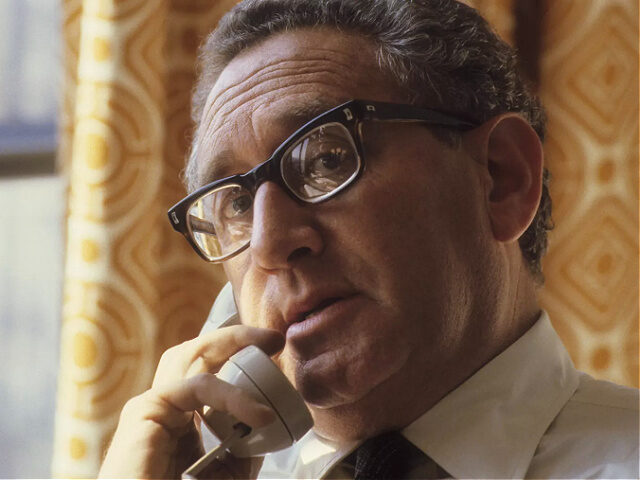The late Secretary of State Henry Kissinger, who passed away last week at the age of 100, gave a recent interview in which he suggested that Hamas’s terror attack October 7 had killed the two-state solution, and Jordan should rule the West Bank.
The October 18 interview, published by Politico on Saturday, is thought possibly to be Kissinger’s last. It includes the following:
I am in favor of a peaceful outcome. I don’t see a peaceful outcome with Hamas involved in the conflict. I would favor negotiations between the Arab world and Israel. I do not see, especially after these events, that direct negotiations between Israel and the Palestinians are very fruitful.
…
A formal peace doesn’t guarantee a lasting peace. The difficulty of the two-state solution is shown by the experience of Hamas. Gaza was made quasi-independent by [former Israeli Prime Minister Ariel] Sharon in order to test the possibility of a two-state solution. It has led, in fact, to a much more complex situation. It has become so much worse in the last two years than it has been in 2005. So the two-state solution doesn’t guarantee that what we saw in the last weeks won’t happen again.
…
I believe the West Bank should be put under Jordanian control rather than aim for a two-state solution which leaves one of the two territories determined to overthrow Israel. Egypt has moved closer to the Arab side, so Israel will have a very difficult time going forward. I hope that at the end of it there will be a negotiation, as I had the privilege to conduct at the end of the Yom Kippur War. At that time, Israel was stronger relative to the surrounding powers. Nowadays, it requires a greater involvement of America to prevent a continuation of the conflict.
Kissinger was referring to the “disengagement” by Israel from Gaza in 2005, when it pulled out all of its soldiers and civilians.
Instead of turning Gaza into a viable state, despite generous promises of international aid, the Palestinians turned it into a staging ground for terror attacks and rocket fire against Israel. Hamas aso seized power from the Palestinian Authority in a 2007 coup, making the problems of the Gaza Strip even worse and giving Iran a foothold in the area, leading to several conflicts with Israel.
The “Jordanian option” has long been favored by the Israeli right, though it has been, until now taboo in foreign policy circles.
Palestine, as governed by Britain after the First World War, included land on both sides of the Jordan River. In 1922, Britain divided the land into Transjordan (which later became Jordan), and Palestine; the latter was to provide for a “Jewish national home,” with consideration to the rights of Arabs as well. Palestine was ultimately partitioned between a Jewish and Arab state by the United Nations; the Arabs rejected the plan.
Dutch right-wing politician Geert Wilders recently triggered international controversy by declaring that “Jordan is Palestine” — a proposal with which Kissinger might, apparently, agree in the wake of the October 7 terror attack.
Joel B. Pollak is Senior Editor-at-Large at Breitbart News and the host of Breitbart News Sunday on Sirius XM Patriot on Sunday evenings from 7 p.m. to 10 p.m. ET (4 p.m. to 7 p.m. PT). He is the author of the new biography, Rhoda: ‘Comrade Kadalie, You Are Out of Order’. He is also the author of the recent e-book, Neither Free nor Fair: The 2020 U.S. Presidential Election. He is a winner of the 2018 Robert Novak Journalism Alumni Fellowship. Follow him on Twitter at @joelpollak.

COMMENTS
Please let us know if you're having issues with commenting.